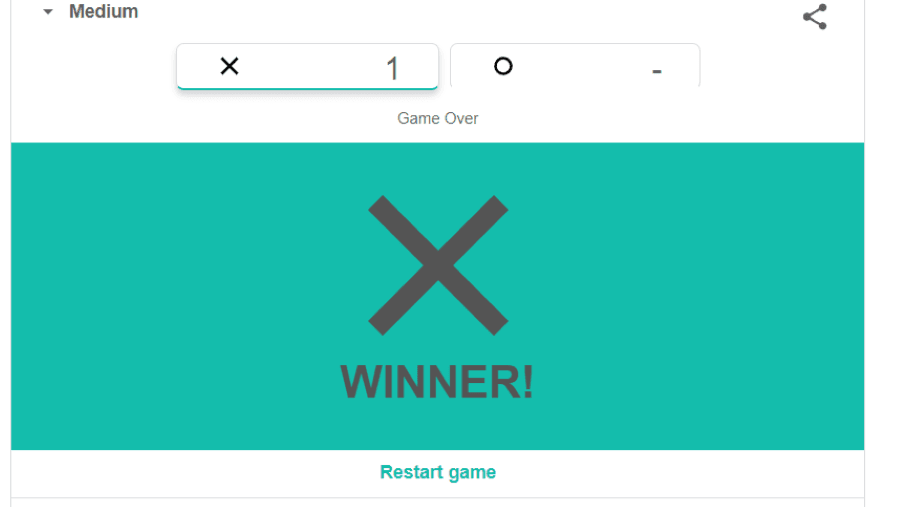Why Google’s Tic-tac-toe game is designed to let you win

The latest Easter Egg from Google deploys some sneaky psychology.
Google has added a couple of neat new Easter Eggs to its search results. If you search for "Solitaire", you can enjoy the card game that a generation of Windows 3.1 users obsessed over right in your browser. And if you search for "tic-tac-toe", you can play the game that's frequently known as noughts and crosses. That's bad news for anyone who is building a tic-tac-toe app to sell, though realistically there's not a lot of dosh to be made there anyway.
Tic-tac-toe is a game that people don't play terribly often, because a bout between two skilled players will always end in a draw. Decades ago, one of my high school computer science projects was to write a tic-tac-toe program that could never be beaten. I'm sure I'd be horrified at the code if I looked at it now, but it worked. Block any wins and make sure the other player can't create a "fork" (a scenario where there are simultaneously two possible winning moves) and you're essentially done.
Knowing that, I was a bit surprised that when I tested out the new Google version, it was all too easy to win. Google Tic-tac-toe never tried to block any of my fork-building moves. For a company obsessed with machine learning, tic-tac-toe is a truly trivial problem. What gives, Google?
What I didn't notice immediately is that there's actually a difficulty setting drop-down, and it defaults to medium. On this setting, Google's player is reasonably intelligent, but doesn't block the fork-building strategy. In easy mode, it won't even always block you when you have two simple Xs in a row. Switch to "Impossible" though and the game will compete perfectly, and you'll never win.
What's telling about this is that Google has clearly thought carefully about which option to present. By defaulting to medium, you're likely to hang around and play for longer, and you'll feel happier because you occasionally get to win. That's more pleasing than being beaten by a computer. After all, who wants to be reminded that a machine knows so much more than you do?
Google's big enough that it can indulge in strange experiments, even if there's no obvious prospect of making money from them. Even then, however, it's going to work hard to make sure you enjoy the experience.
Bonus happiness tip? Forget tic-tac-toe and try out the Google Doodle version of Pac-Man instead. It is Friday, after all.

Angus Kidman's Findings column looks at new developments and research that help you save money, make wise decisions and enjoy your life more. It appears Monday through Friday on finder.com.au.
Latest news headlines
-
Enjoy up to 50% off Momentum 4 Wireless Special Editions
26 Dec 2025 |
-
With thousands of deals from hundreds of retailers, these are the 10 best bargains this Black Friday
28 Nov 2025 |
-
How much can you save on the Dyson Airwrap this Black Friday?
25 Nov 2025 |
-
WHOOP Black Friday 2025: Save up to $100 on the WHOOP 5.0 and WHOOP MG
20 Nov 2025 |
-
LG has a slashed prices by up to 40% for Black Friday
20 Nov 2025 |
